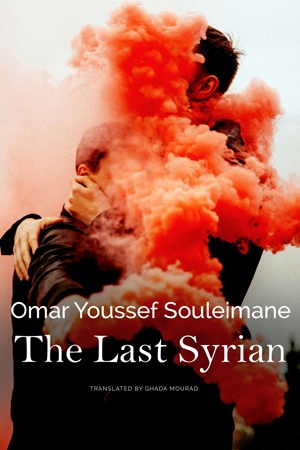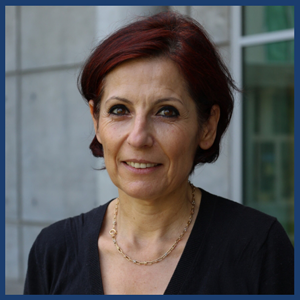
By Nikki Babri
Set against the tumultuous backdrop of the Syrian Revolution, Omar Youssef Souleimane’s The Last Syrian is a poignant tale of forbidden love and political defiance. Through the vivid translation by UC Irvine lecturer Ghada Mourad, it is now available to English-language readers.
Mourad, a lecturer in French, Humanities Core and comparative literature, was inspired to undertake the project because its setting in Syria at the beginning of the 2011 uprisings hit close to home. The Syrian Revolution, which began during the Arab Spring, initially sought political reform and greater freedoms. This resulted in violent government crackdowns and anti-revolutionary interventions that escalated into a devastating civil war, causing a humanitarian crisis with widespread casualties, displacement and destruction.

The novel, which follows the lives of a group of young dissenters, brings homosexuality to the center stage as its characters rebel against societal norms, their families and religious constraints – all while also engaging in the larger political struggle. Youssef, one of the novel’s central figures, embodies this struggle as he balances political and personal liberation. He becomes lovers with a man named Mohammed, their exchanged emails interrupting the story until they ultimately become the knots stitching it together. This, Mourad notes, is what makes the narrative complete.
“It skillfully weaves together the sexual and the political, reminding us that the personal is always already political,” Mourad, a graduate of UCI’s comparative literature Ph.D. program, explains. “Sexual dissent runs parallel to the political one. The young characters that we meet in this novel each wage their own revolution in addition to the political one they’re undertaking together.”
Challenging stereotypes
Mourad notes that the novel avoids stereotypes about both homosexuality and women’s rights. She was deeply drawn to a woman in a hijab who encourages her male fiancé to join the uprisings, as well as the lead female character rebelling against her family by organizing protests. “Many acts of resistance and rebellion combine in this novel to present a mosaic of a revolution that quickly transformed into a civil war because it was brutally repressed by the Syrian government, quickly hijacked by the counter-revolutionary Islamist groups and co-opted by the Western-supported Syrian secular intellectuals,” Mourad says.
The novel contributes significantly to the discourse on LGBTQ+ rights and political freedom in the Middle East. Mourad highlights that while narratives of gay love are not new to Arabic literature, they have often been accompanied by narratives of marginalization, rejection and persecution.
“Gay love is no stranger to Arabic poetry,” she explains, citing Abu Nuwas, an 8th-century Arabic poet whose poems celebrated gay love within Arabic culture. “The Last Syrian refuses to reduce the story to a narrative of victimization. Gay love is not told as a narrative of oppression, but one of struggle for freedom and dignity.”
Preserving poetic prose
Translating Souleimane's prose was a challenge Mourad embraced. For her, preserving the unique nuances of Souleimane's language was essential.
Souleimane previously worked as a journalist, writer and poet in Syria and wrote in Arabic, his native language. He fled Syria for France in 2012 to escape persecution for his pro-democratic activities and later wrote The Last Syrian in French, his adopted language.
“This novel was published in 2020, eight years after he settled in France, which is not enough time for him to leave behind the idiom of Arabic or to switch to the French idiom,” Mourad says, noting that Souleimane specifically asked that his translator come from the Levant, a region comprising countries in the Eastern Mediterranean. Though his French does not sound Arabic, Mourad believes her shared bilingual and bicultural perspective was crucial in preserving the novel's original nuance and beauty.
Mourad hopes the book will bridge cultural and linguistic divides, offering empowerment to readers worldwide. Western readers will resonate with the universal yearning for liberty as the novel’s characters fight for a life of freedom without fear and oppression. Readers will also be reminded that the struggle for sexual justice is inseparable from the fight for political and social justice.
“I hope that readers see in this story a universal one in the sense that a revolution can be defeated only momentarily. It is bound to resurge as long as the people are living under oppression,” she shares. “Through all the nightmarish experiences the characters undergo, there is beauty in the love stories, the romantic encounters and the courage of these young characters risking everything in their lives to live and love freely.”
Equally, she turns toward readers in the Arab world with the desire that those who feel frustrated and defeated at the outcome of the Arab uprisings find their own hope and strength from the narrative.
The journey of translation
The translation process took Mourad two years, involving several literary translation workshops supported by grants from UCI's International Center for Writing and Translation (ICWT) and professional awards Mourad received. These workshops, conducted online, facilitated collaboration and discussion among translators from different continents and languages. While it was a multilingual workshop, the target language across all translators was English.
“Literary translation is a therapeutic activity for me that I enjoy greatly,” she shares. “Translating while teaching can be doubly therapeutic because it gives me a change of pace, topic and an escape into the text.”

Currently, Mourad is working on translating a Moroccan academic’s poetry collection from Arabic to English. His poetry relates the immigrant experience and the pains of exile, estrangement and marginalization. “I relate deeply to his heart-shattering poetry,” she explains. “As we live in a time where human migration and displacement are at their highest in the history of humanity, a great number of people would identify with the themes of these poems.”
She is grateful for the continued support of the academic community at UC Irvine, where she has found camaraderie and solidarity through her years as a Ph.D. student and lecturer. “I much appreciate being part of this community that shares the same yearning for freedom as this novel’s characters and cares about other humans and their suffering. Coming from an area embroiled by wars, it is heartwarming for me to see students, staff and academics coming together to express solidarity with the oppressed.”
Interested in reading more from the School of Humanities? Sign up for our monthly newsletter.
